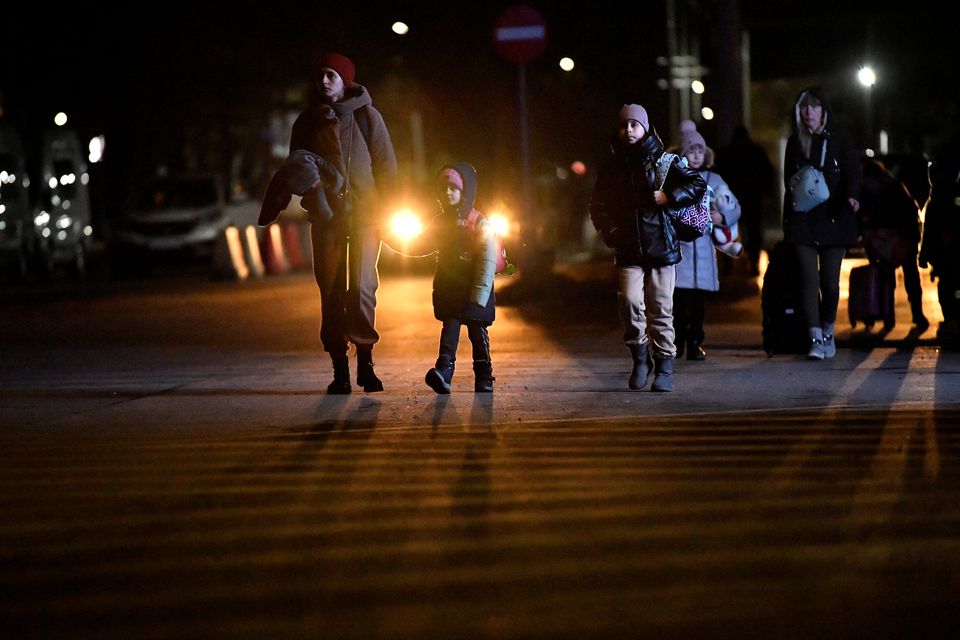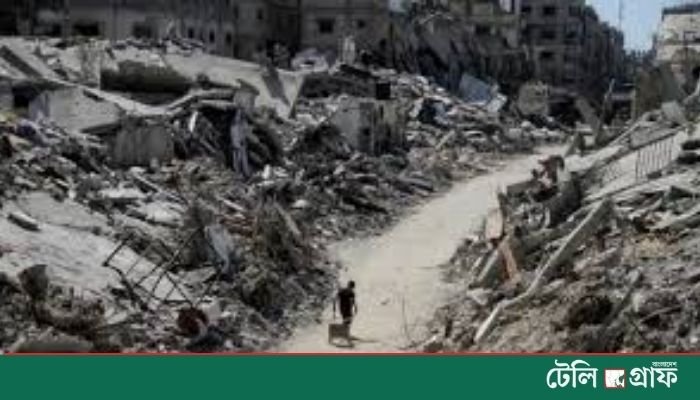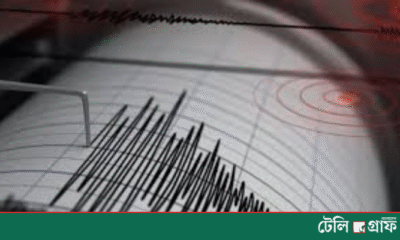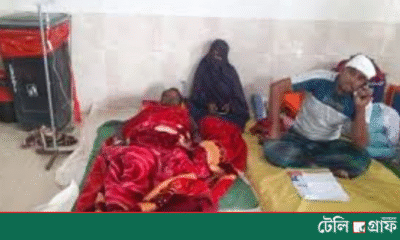International
Moscow says it will let Ukrainian civilians flee – to Russia

LVIV/IRPIN, Ukraine, March 7 (Reuters) – Ukrainian officials said a bread factory had been hit by a Russian air strike on Monday as the country’s negotiators assembled for talks with Russian officials after previous rounds that brought no respite in the conflict.
The bodies of at least 13 civilians were recovered from the rubble after a factory in the town of Makariv in the Kyiv region was hit, local emergency services said. Five people were rescued off the 30 believed to have been there at the time. Reuters was not immediately able to verify the reported attack.
Russia earlier offered Ukrainians escape routes to Russia and its close ally Belarus on Monday after weekend evacuation ceasefire attempts failed. In the besieged southern port city of Mariupol, hundreds of thousands of people remained trapped without food and water under regular bombardments.
A Ukrainian negotiator urged Russia to stop its assault on Ukraine, which the United Nations said had sent 1.7 million people fleeing to Central Europe.
“In a few minutes, we will start talking to representatives of a country that seriously believes large-scale violence against civilians is an argument,” Ukrainian negotiator Mykhailo Podolyak said on Twitter. “Prove that this is not the case.”
Under the Russian offer, a corridor from the capital Kyiv would lead to Russia’s ally Belarus, while civilians from Kharkiv, Ukraine’s second biggest city, would be directed to Russia, according to maps published by the RIA news agency.
“Attempts by the Ukrainian side to deceive Russia and the whole civilised world…are useless this time,” the Russian defence ministry said after announcing the “humanitarian corridors”.
A spokesperson for Ukrainian President Volodymyr Zelenskiy said the Russian proposal was “completely immoral”.
“They are citizens of Ukraine, they should have the right to evacuate to the territory of Ukraine,” the spokesperson said.
A day earlier, Reuters journalists had witnessed people trying to flee the town of Irpin near Kyiv getting caught in Russian shelling.
On Monday people picked their way over the twisted ruins of a large bridge in Irpin, with river water rushing just beneath them.
“It’s like a disaster. The city is almost ruined and the district where I’m living (there are) no houses which were not bombed,” a young woman leaving with her children told Reuters.
Russia denies deliberately targeting civilians. It calls the campaign it launched on Feb. 24 a “special military operation” to disarm Ukraine and remove leaders it describes as neo-Nazis. Ukraine and its Western allies call this a transparent pretext for an invasion to conquer a nation of 44 million people.
International
24 Killed in Israeli Strikes Despite Gaza Ceasefire

Despite a six-week-long ceasefire in the Gaza Strip, at least 24 Palestinians have been killed in renewed Israeli air and drone strikes. The attacks, which began early Saturday, also left 87 others injured, according to local health authorities. Children are reported to be among the dead.
Witnesses said the first strike targeted a car in northern Gaza City, followed by successive attacks in Deir al-Balah and the Nuseirat refugee camp. In Gaza City’s Rimal area, a drone strike killed 11 people and injured 20 others. Rami Muhanna, director of Al-Shifa Hospital, confirmed that many of the wounded remain in critical condition.
In Deir al-Balah, a strike on a residential house left three people dead, including a woman. The blast was so powerful that nearby residents fled in panic. “This cannot be called a ceasefire,” said eyewitness Khalil Abu Hatab. “There is no safe place left.”
Hamas has accused Israel of repeatedly violating ceasefire terms and has urged the United States to intervene immediately. The group claims the strikes are targeting civilians and called for stronger international action to halt the attacks.
International observers warn that the renewed violence could escalate tensions further amid Gaza’s deepening humanitarian crisis.
International
Trump Designates Saudi Arabia a Major Non-NATO Ally at White House Dinner

The United States has designated Saudi Arabia as one of its most important non-NATO military allies, President Donald Trump announced on Tuesday during a White House dinner held in honour of Saudi Crown Prince Mohammed bin Salman, according to Al Jazeera.
Trump said the official designation as a Major Non-NATO Ally would elevate military cooperation between the two countries. The United States has granted this status to only 19 nations so far. He added that the decision had been kept confidential until the event at Saudi Arabia’s request.
The President also noted that the Crown Prince would play a role in a council being formed to establish peace in Gaza, adding that he himself would serve as its chairman, as previously stated.
Earlier, Crown Prince Mohammed bin Salman arrived in the United States for the meeting. Discussions covered military cooperation, nuclear technology, artificial intelligence, and increased Saudi investments in the US. The Crown Prince announced plans to raise Saudi investments from 600 billion USD to 1 trillion USD.
Talks also included potential sales of advanced F-35 fighter jets to Saudi Arabia.
International
Al-Aqsa’s Chief Preacher Faces Trial in Israel Over ‘Incitement’ Charges

Israel is set to put Sheikh Ekrima Sabri, the chief preacher of the Al-Aqsa Mosque in East Jerusalem, on trial over alleged “incitement.” The 86-year-old cleric is scheduled to appear before the Jerusalem Magistrate Court on Tuesday (18 November), according to a report by Anadolu Agency.
The court will review an indictment filed by the Israeli Public Prosecution, accusing Sabri of expressing condolences over the death of Hamas leader Ismail Haniyeh—killed in an Israeli strike in Iran in 2024—and offering prayers for Palestinians shot dead in the occupied West Bank in 2022.
In August 2024, Israeli police barred Sabri from entering Al-Aqsa for six months after he publicly mourned Haniyeh’s death. His legal team argues that the move is politically motivated and driven by right-wing groups seeking to target the prominent cleric.
They claim Sabri has long faced travel bans, restrictions on entering Al-Aqsa, and even demolition orders on his home—actions they describe as part of a broader pattern of political, religious, and ideological persecution.
Israeli officials, including National Security Minister Itamar Ben-Gvir and Interior Minister Moshe Arbel, have previously acted against Sabri, frequently accusing him of delivering pro-Gaza sermons.
Al-Aqsa, Islam’s third-holiest site, sits in a location Jews refer to as the “Temple Mount,” believed to have housed two ancient Jewish temples. Israel captured East Jerusalem in the 1967 Arab–Israeli war and unilaterally annexed the city in 1980—a move not recognized by the international community.
-

 People and Culture2 days ago
People and Culture2 days agoStrong Quake Shakes Bangladesh: Seven Dead, Hundreds Injured
-

 Crime and Justice2 days ago
Crime and Justice2 days agoBangladeshi Passenger Held at Benapole with Large Sum of Foreign Currency
-

 Economy22 hours ago
Economy22 hours agoGiant 32-kg Poa Fish Caught Near St Martin’s; Fisherman Demands Tk 600,000
-

 CRICEKET2 days ago
CRICEKET2 days agoThree Bangladeshi Stars Register for Women’s IPL Mega Auction in Delhi
-

 People and Culture23 hours ago
People and Culture23 hours agoWedding Invitation Dispute Sparks Violent Clash in Jhenaidah; 10 Injured
